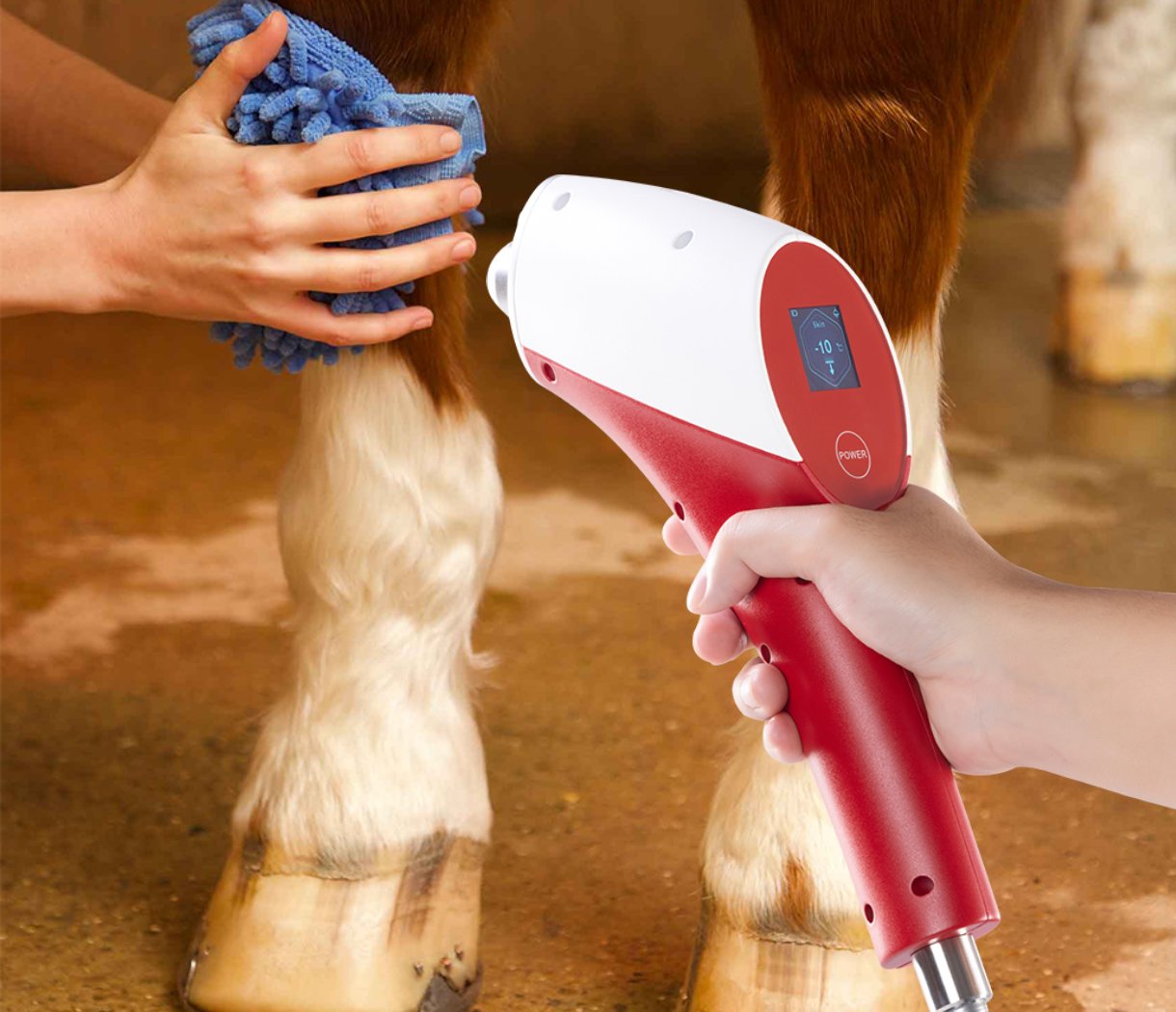Introduction: What’s the Deal with Equine Desmitis?
Equine desmitis is a common yet painful condition that affects the tendons and ligaments of horses, especially those involved in high-intensity activities like racing, jumping, and heavy training. When these tissues become inflamed due to repetitive strain or overuse, it results in swelling, tenderness, and pain—making it difficult for the horse to perform at its best. Not only does it cause discomfort, but untreated desmitis can lead to longer-term mobility issues. The goal for any equine athlete is to get back to their best performance level as quickly as possible, and that’s where CO2 Cryotherapy steps in.
CO2 Cryotherapy: The Superhero Treatment You’ve Never Heard Of
Enter CO2 Cryotherapy, the coolest superhero in the world of equine rehabilitation. This treatment uses carbon dioxide (CO2), applied in a targeted, controlled manner to reduce inflammation, relieve pain, and speed up recovery in injured tissues. Unlike traditional ice packs or cold therapy methods that only work on the surface, CO2 Cryotherapy goes deeper to provide longer-lasting results. The therapy works by rapidly cooling the injured area, reducing blood flow momentarily to minimize swelling and pain. After the cold application ends, the blood vessels dilate, improving blood circulation and promoting faster healing. The best part? It’s drug-free and non-invasive, making it an ideal choice for treating conditions like desmitis.
How It Kicks Desmitis’ Butt
So, how does CO2 Cryotherapy really work its magic on desmitis? The therapy uses extreme cold to target the injured tendon or ligament precisely. The immediate result is a reduction in inflammation and pain relief, which can provide comfort almost immediately. However, the benefits don’t stop there. The cold also numbs the area, allowing for a more comfortable recovery experience. What makes this treatment especially effective is its precision. Traditional ice or cold hosing tends to treat a broader area, affecting healthy tissue in the process. CO2 Cryotherapy, however, targets only the problem area, providing relief where it’s needed most without wasting time or energy on healthy, unaffected tissues. In addition to reducing inflammation and pain, CO2 Cryotherapy promotes quicker healing by encouraging oxygen-rich blood to flow into the injured area once the cold application is finished. This helps accelerate the recovery of damaged tissues and prevents future flare-ups of inflammation.
What Happens in a CO2 Cryotherapy Session?
A typical CO2 Cryotherapy session lasts 10 seconds, making it a fast and efficient treatment option for horses dealing with desmitis. The process begins with a professional applying the CO2 treatment to the affected area. The therapy is precise, allowing it to focus only on the injured tendon or ligament, unlike traditional ice therapy which affects a larger area. One of the best things about CO2 Cryotherapy is that it doesn’t require sedation or cause significant discomfort. Most horses remain relaxed throughout the process, and they can return to regular activities soon after the session. The session itself is simple, fast, and well-tolerated by most horses, making it a great option for both acute and ongoing injuries.
Why It is Cooler Than Other Treatments
What makes CO2 Cryotherapy stand out from other treatments like ice therapy or cold hosing? Precision and effectiveness. Ice packs tend to affect a broad area, sometimes slowing down the healing process of non-injured tissues. CO2 Cryotherapy, however, targets only the affected area, ensuring faster and more precise relief. Another advantage is that CO2 Cryotherapy works on a deeper level than traditional cold therapy. Instead of just cooling the surface, it helps increase blood flow post-treatment, which accelerates the healing process. It’s also non-invasive and drug-free, providing an excellent alternative for horses that may not respond well to medications or more invasive procedures.
For the Fierce Athletes: CO2 Cryotherapy’s Role in Keeping Your Horse in Top Shape
For horses in active training or competition, keeping tendons and ligaments in top shape is crucial. CO2 Cryotherapy can help prevent injuries by reducing strain and providing quicker recovery from any existing issues. It also aids in reducing the impact of minor strains and sprains before they become major problems. Whether your horse is a racehorse, jumper, or show horse, this treatment is designed to keep them performing at their best. It speeds up recovery time, reduces pain, and helps ensure peak performance when they need it most.
Conclusion: Chill Out and Let CO2 Cryotherapy Do Its Thing
Equine desmitis can be a real hurdle for performance horses, but with CO2 Cryotherapy, you can help your horse recover faster, feel better, and get back to doing what they love. The quick, targeted, and non-invasive nature of this treatment makes it the ideal choice for addressing tendon and ligament injuries. Plus, it’s safe, effective, and doesn’t require sedation—getting your horse back on track has never been so easy.



